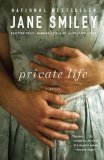Summary | Excerpt | Reading Guide | Reviews | Beyond the Book | Read-Alikes | Genres & Themes | Author Bio

This article relates to Private Life
Margaret and Andrew of Private Life are cut from the same cloth as George Eliot's classic unhappy spouses, Dorothea Brooke and the Reverend Edward Casaubon. Eliot's Middlemarch was published in 1874, just a few years before Smiley's character, Margaret Mayfield, is born.
Dorothea Brooke is an intelligent and idealistic young woman, the kind of girl who didn't have a lot of options in early nineteenth-century England (as Eliot spells out). She is just 19 when she meets Casaubon who is almost fifty. (Margaret and Early are a bit closer in age – when they marry she's 27 and he's 38.)
 Casaubon appeals to Dorothea because of his intellectual seriousness. "Here was something beyond the shallows of ladies'-school literature," she reflects during her first conversation with him, "Here was a modern Augustine who united the glories of doctor and saint." She convinces herself that marriage to him will give her an education and engage her in important work. She wonders whether she ought to learn Greek and Latin before the wedding.
Casaubon appeals to Dorothea because of his intellectual seriousness. "Here was something beyond the shallows of ladies'-school literature," she reflects during her first conversation with him, "Here was a modern Augustine who united the glories of doctor and saint." She convinces herself that marriage to him will give her an education and engage her in important work. She wonders whether she ought to learn Greek and Latin before the wedding.
Casaubon is a dried-up prig who thinks of himself as a scholar of the highest order. He's devoted his life to a magnum opus, The Key to All Mythologies. (Andrew Early's work is more up-to-date but no less grandiose: The Universe Explained.) He's eager to get courtship over so he can get back to work, with Dorothea easing the burden on his aged eyes, but can hardly get up enough passion to cement the deal. He is surprised to discover that the "stream of feeling" is such an "exceedingly shallow rill."
Dorothea soon learns that her husband's great work is barking up the wrong tree – German scholars have already surpassed him (as Einstein has left Capt. Early in the dust). He tries to make her vow she will finish his futile, endless book for him if he cannot, and the burdensome promise is on the tip of her tongue when he, conveniently, dies.
Eliot's solution for Dorothea doesn't seem very satisfying, however happy: Dorothea weds Will Ladislaw, and after her marriage, "Many who knew her thought it a pity that so substantive and rare a creature should have been absorbed into the life of another, and be only known in a certain circle as a wife and mother."
In her own life Eliot was at once more radical – living out of wedlock with George Lewes because he could not get a divorce – and more prosaic. There was plenty of work to be done in a two-intellectual household. She describes a typical working Christmas, "Having no grandchildren to get up a Christmas-tree for, we had nothing to divert our attention from our headaches."*
*Letter to John Blackwood, Jan 1, 1872
Images: Left: Jane Smiley; Right: George Eliot (Mary Anne Evans) aged 30 by Alexandre Louis François
Filed under Books and Authors
![]() This "beyond the book article" relates to Private Life. It originally ran in May 2010 and has been updated for the
June 2011 paperback edition.
Go to magazine.
This "beyond the book article" relates to Private Life. It originally ran in May 2010 and has been updated for the
June 2011 paperback edition.
Go to magazine.
Any activity becomes creative when the doer cares about doing it right, or better.
Click Here to find out who said this, as well as discovering other famous literary quotes!
Your guide toexceptional books
BookBrowse seeks out and recommends the best in contemporary fiction and nonfiction—books that not only engage and entertain but also deepen our understanding of ourselves and the world around us.